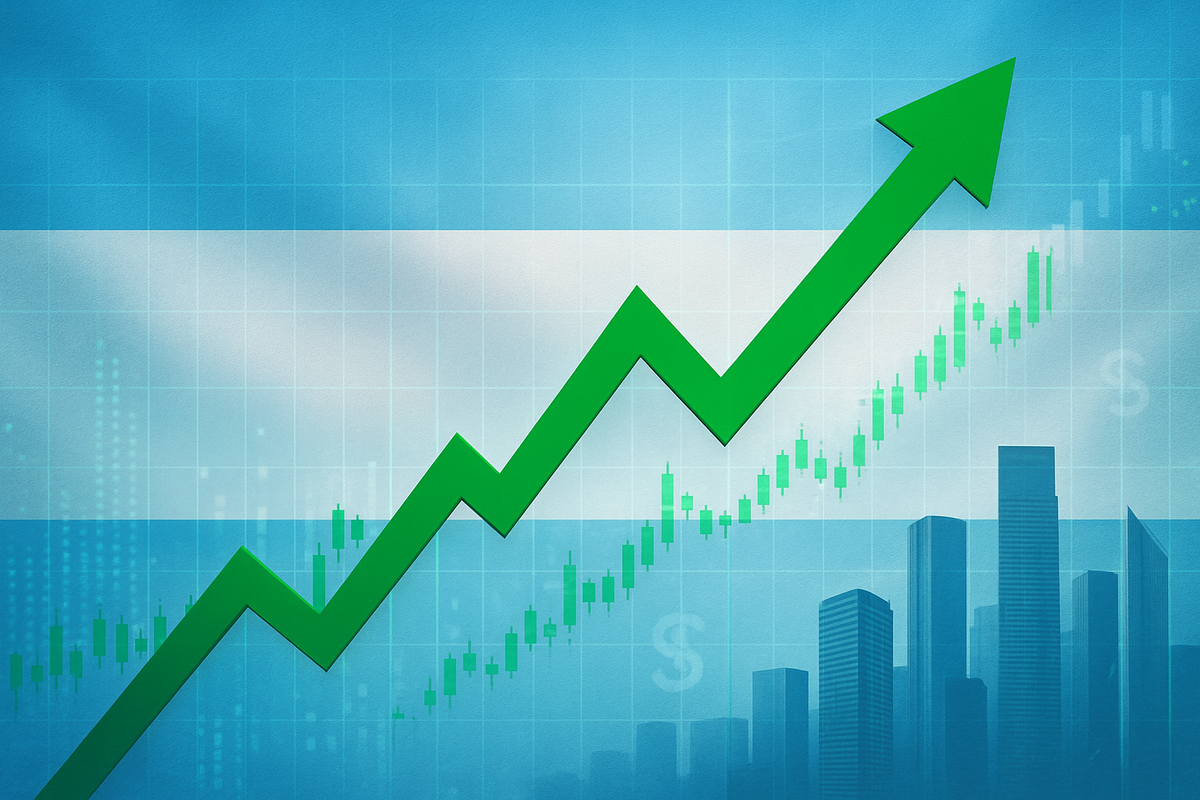
Buenos Aires, Argentina – October 27, 2025 – Argentine financial markets have erupted in a massive rally, with local stocks and the peso surging, following a resounding victory for President Javier Milei's party, La Libertad Avanza (LLA), in the October 2025 midterm legislative elections. This electoral triumph, which saw LLA secure a commanding 41% of the national vote and significantly increase its representation in both houses of Congress, has ignited renewed investor confidence in Milei's radical pro-market reforms and his ability to accelerate Argentina's economic transformation. The market's euphoric response signals a strong belief that the path to fiscal consolidation, deregulation, and sustained growth is now more firmly established.
This latest surge echoes the initial market enthusiasm that followed Milei's presidential election victory in November 2023, which also saw a significant rally in equities and a complex but ultimately positive re-evaluation of the peso. However, the October 2025 midterm results provide a crucial legislative mandate, empowering the libertarian leader to push through his ambitious agenda with fewer political obstacles, thereby de-risking Argentina's investment landscape in the eyes of many international observers and domestic stakeholders alike.
A Second Wave of Market Optimism: Details of the October 2025 Rally
The market's reaction to Milei's midterm success was immediate and dramatic. On the day following the election, Argentine bonds reportedly surged by an impressive 10-15 points, with the country's 2030 bond rising 11 percentage points (a 15% gain) and its 2035 bond climbing 12 points (a 22% gain). Local stocks mirrored this enthusiasm, soaring over 20% in a single trading session. The Argentine peso, which had previously faced significant devaluation pressures, strengthened significantly against the dollar, gaining more than 10% against the U.S. dollar stablecoin on cryptocurrency exchanges, reflecting a newfound confidence in the currency's stability.
This rally stands in stark contrast to the market downturn experienced just a month prior in September 2025, when Milei's party suffered a provincial election loss in Buenos Aires, causing the S&P Merval index to plummet by 13.3% and the peso to fall by over 5% in intraday trading. The swift reversal underscores the market's sensitivity to political developments and its strong preference for a clear mandate for Milei's reform agenda. The initial presidential victory in November 2023 had already seen the S&P Merval rise by 17.8% and ADRs of Argentine companies like YPF (NYSE: YPF) jump over 40%, setting a precedent for the current wave of optimism.
Key players in this unfolding economic narrative include President Milei and his burgeoning La Libertad Avanza party, whose unexpected electoral strength has surprised many political analysts. International investors, particularly those from the U.S. who have shown continued support for Milei's reforms, are also critical stakeholders. The U.S. has notably provided a significant financial backstop, further solidifying the perception of stability. The initial market reactions clearly indicate renewed investor confidence in Milei's ability to accelerate structural reforms, including fiscal consolidation, deregulation, and privatization, which are seen as essential for Argentina's long-term economic health.
Companies Poised for Gains and Navigating Challenges
Javier Milei's pro-market reforms are fundamentally reshaping the landscape for Argentine public companies, creating both significant opportunities and notable challenges. Sectors poised to benefit most from deregulation, increased foreign investment, and a more stable macroeconomic environment include energy, finance, and export-oriented industries.
In the energy sector, companies like YPF S.A. (NYSE: YPF), the state-operated oil giant, have seen their shares surge. Milei's commitment to privatization (or at least asset disposals), deregulation of oil prices, and incentives for Vaca Muerta shale development are highly favorable. Pampa Energía S.A. (NYSE: PAM), Argentina's largest integrated electricity company with diversified holdings in oil, gas, and petrochemicals, is also well-positioned due to its dollar-linked contracts and robust operational base. Other beneficiaries include Vista Energy S.A.B. de C.V. (NYSE: VIST), focused on Vaca Muerta, and electricity generator Central Puerto S.A. (NYSE: CEPU), both expected to gain from deregulation and infrastructure modernization.
The financial sector is also anticipating a positive shift. Banks such as Banco Macro S.A. (NYSE: BMA), Grupo Financiero Galicia S.A. (NASDAQ: GGAL), and Banco BBVA Argentina S.A. (NYSE: BBAR) are expected to benefit from declining inflation, improved macroeconomic stability, and the eventual reactivation of loan demand. Galicia, now Argentina's largest private bank after acquiring HSBC's local operations in December 2024, is particularly well-positioned to capitalize on the liberalization of foreign exchange controls and increased banking penetration. However, these institutions remain sensitive to political uncertainty, as evidenced by past stock volatility during periods of Milei's political setbacks.
Export-oriented industries are set to thrive under Milei's policies, which include currency devaluation, plans to eliminate export taxes, and efforts to streamline trade. Agricultural powerhouses like Cresud S.A.C.I.F. y A. (NASDAQ: CRESY), with its vast landholdings, will see improved competitiveness for its exports. Similarly, Loma Negra Compañía Industrial Argentina Sociedad Anónima (NYSE: LOMA), a major cement producer, could see increased demand from renewed investment in infrastructure and a broader economic recovery.
Conversely, some companies face significant challenges. Telecom Argentina S.A. (NYSE: TEO) has seen its stock rally but faces concerns regarding high valuation, substantial debt maturing in 2024-2025, and potential impacts from a broader economic slowdown on subscriber growth. Furthermore, companies heavily reliant on peso-denominated revenue, those that previously benefited from state subsidies (e.g., certain public utilities), and those exposed to high local borrowing costs during the transition period may struggle to adapt to the new economic paradigm of reduced state intervention and fiscal austerity.
Broader Implications: A New Era for Argentina and Emerging Markets
Milei's strengthened mandate and the subsequent asset rally signify a pivotal moment for Argentina, with wider implications that resonate across global financial markets and geopolitical landscapes. This event firmly positions Argentina as a test case for radical free-market reforms in an emerging economy grappling with historical instability. The market's enthusiastic response underscores a global trend where political stability and a credible commitment to reform are highly prized by international investors, particularly in regions prone to populism.
The regulatory and policy implications of Milei's enhanced legislative power are profound. His administration is now better equipped to accelerate fiscal consolidation, aiming for a structurally balanced budget through continued aggressive spending cuts. The long-anticipated privatization of state-owned enterprises, including entities in energy (ENARSA, Nucleoeléctrica Argentina S.A.), water utilities (AYSA), and transportation, is expected to gain significant momentum. Furthermore, deeper deregulation across various sectors, coupled with reforms to labor and tenancy laws, is on the horizon. Milei's ultimate goal of full dollarization and the abolition of the Central Bank, though controversial, could now move closer to reality, offering a radical solution to Argentina's perennial inflation problem.
The ripple effects extend beyond Argentina's borders. A successful economic turnaround could inspire similar right-wing or free-market movements across Latin America, particularly if Argentina demonstrates sustained growth and stability. Geopolitically, Milei's closer alignment with the United States and Western powers, backed by U.S. financial support, solidifies a shift from previous administrations, potentially impacting regional blocs like Mercosur and fostering new bilateral trade and investment agreements. Argentina's vast natural resources—lithium, oil, gas (Vaca Muerta), and agricultural capacity—stand to benefit immensely from pro-investment policies, potentially affecting global commodity markets and competing producers.
Historically, comparisons are often drawn to Carlos Menem's neoliberal reforms in the 1990s, which included extensive privatizations and a currency board. While Menem's policies initially curbed hyperinflation and spurred growth, they ultimately contributed to the 2001 crisis due to an overvalued currency and mounting debt. Milei's agenda shares similarities in its commitment to fiscal discipline and privatization but aims for full dollarization rather than a fixed exchange rate, a move proponents argue could prevent a similar collapse. The success of this ambitious experiment will be closely watched by other emerging markets seeking to escape cycles of inflation and debt.
What Comes Next: Navigating the Path to Prosperity
With a strengthened mandate, Argentina stands at a critical juncture, facing both immense opportunities and significant challenges in the short and long term. In the immediate future (late 2025-2026), the focus will be on solidifying disinflation, which has already seen monthly rates drop to around 2% by late 2025, and maintaining the fiscal surplus achieved in early 2025. The economy, after a contraction in 2024, is projected by the IMF to rebound with 5.5% GDP growth in 2025, driven by improved credit and a better business environment. The current market rally and the attraction of significant hidden U.S. dollar savings through tax amnesty further bolster foreign exchange reserves and the peso.
Longer term (beyond 2026), Milei's administration is poised to push for deeper structural reforms, including comprehensive labor and pension reforms, further privatization, and significant tax reform. The ultimate goal of dollarization and the dismantling of the Central Bank remains a key, albeit radical, objective. The increased legislative capacity of LLA will be crucial in passing these complex legislations, potentially leading to sustained growth and a reduction in the public debt-to-GDP ratio. However, strategic pivots will be necessary, including a less confrontational approach to consensus-building with governors and managing social unrest, which has been a byproduct of initial austerity measures despite declining poverty rates by mid-2025.
Market opportunities are particularly strong in resource-rich sectors like agriculture, energy (Vaca Muerta shale, renewables), and mining (lithium), which are attracting significant foreign investment through incentives like the Large Investment Incentive Regime (RIGI). Argentina's burgeoning technology sector also presents growth potential. However, challenges persist, including the potential for policy reversibility by future administrations, lingering macroeconomic imbalances, and structural impediments such as corruption and inefficient legal processes. Investors must also consider the social and environmental concerns arising from a strong focus on extractive industries.
Various scenarios could unfold. An optimistic scenario sees full implementation of reforms leading to sustained asset appreciation, significant foreign direct investment (FDI), and substantial job creation, transforming Argentina into a stable and attractive emerging market. A moderate scenario involves partial reforms and gradual progress, with market confidence remaining somewhat volatile. In a challenging scenario, reform stalls due to political backlash or social unrest, leading to renewed instability, capital flight, and a potential reversal of the asset rally, pushing Argentina back into its historical cycle of economic crises.
Comprehensive Wrap-up: A Transformative Path Ahead
The massive rally in Argentine assets following Javier Milei's decisive victory in the October 2025 midterm elections marks a critical inflection point for the nation. It underscores a powerful endorsement from both domestic and international markets for his radical economic agenda, signaling a newfound confidence in Argentina's trajectory towards fiscal discipline, deregulation, and private sector-led growth. The key takeaway is that Milei's strengthened mandate provides the legislative leverage necessary to accelerate and deepen reforms, potentially breaking Argentina's long-standing cycle of economic crises.
Moving forward, the market will closely assess the administration's ability to translate this electoral success into tangible policy implementation. While significant progress has been made in taming inflation and achieving a fiscal surplus, the long-term success hinges on navigating political resistance, managing social consequences, and fostering sustainable, inclusive growth. The U.S. financial backing further solidifies the perceived stability, making Argentina a more compelling destination for capital.
Investors should watch for several key indicators in the coming months: the pace of privatization efforts, the advancement of labor and pension reforms, any concrete steps towards dollarization, and the government's ability to maintain social cohesion amidst ongoing austerity. The performance of key sectors like energy (YPF: YPF, Pampa Energía: PAM), finance (Banco Macro: BMA, Grupo Financiero Galicia: GGAL), and agriculture (Cresud: CRESY) will serve as bellwethers for the broader economic recovery. While the path ahead is undoubtedly challenging, the current market euphoria suggests a strong belief that Argentina may finally be embarking on a transformative journey towards lasting economic stability and prosperity.
This content is intended for informational purposes only and is not financial advice





